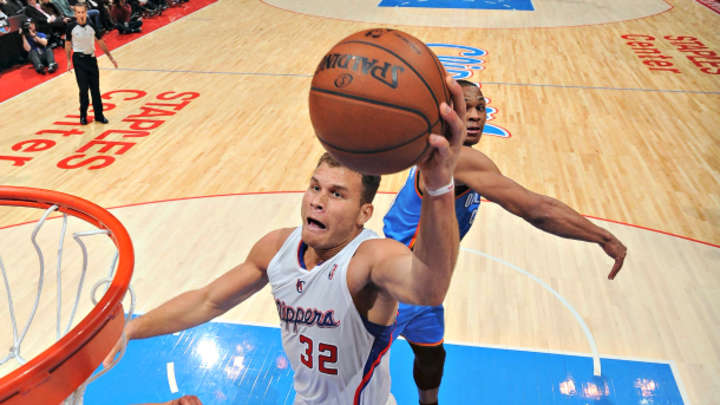Three-Pointers: Blake Griffin, Clippers best outmanned Thunder on the run

Blake Griffin helped balance the fast break for the Clippers on Wednesday. (Noah Graham/NBAE via Getty Images)
The Clippers' 111-103 win over the Thunder was nothing if not eventful, with a pair of ejections, an up-and-down style and the biggest stars involved setting the tone on both sides.
• A matchup decided in transition. The Clippers and Thunder were sloppy in their execution. Both teams, though, made a killing in the open court, and as much as anything, this game was dictated by an exploitation of pace.
In some cases that came via simple fast breaks, which both teams unabashedly looked to maximize. The Clippers, in particular, seemed incredibly eager to get out in transition early. Every defensive rebound was an invitation for a full-on sprint down court, with Chris Paul (14 points, 16 assists) flanked by shooters and finishers as he led the charge.
Blake Griffin (22 points, 12 rebounds, seven assists) made impact play after impact play on the break for L.A., as facilitator and finisher alike. For a player who lives in highlight reels, Griffin has an understated control to his game in transition. He catches damn near everything, as his speed, body control and spatial awareness allow him to go after ambitious lobs that would elude other hyper-athletic big men. Where Griffin gets the most subtle latitude, though, is in his groundwork. Griffin has an unbelievably tight handle for a player his size, and he does an outstanding job of eluding defenders on the break to keep his dribble alive. That's not for nothing, especially when so many bigs (and all other Clippers bigs, especially) get jammed on the bounce when in proximity of even a single defender. There's no such concern with Griffin, who is capable of spinning around multiple opponents and making a perfectly timed feed to a wide-open teammate if necessary.
The Clippers needed every bit of that full-court utility to stave off a late Thunder push, which was in part achieved by ramping up the tempo. OKC had only 19 fast break points to L.A.'s 26, though putting some early pressure on the Clippers' defense helped Kevin Durant (33 points, 10 assists, six rebounds) and Co. establish a far more fluid offense. In segueing quickly from the initial push to the secondary break, the Thunder ball-handlers were able to avoid some of the spacing issues that had clogged up their half-court workings. The first and fourth quarters provided the best examples of this, as the dribble penetration of Durant and Russell Westbrook (19 points, 10 assists, four rebounds) tended to result in a made basket, drawn foul, or an easy look for a nearby teammate. That trend could have been stretched even further had the Thunder had a full fleet of big men active for Wednesday night, but alas.
• The Thunder lost a battle of attrition. Oklahoma City was at a bit of a disadvantage because Kendrick Perkins missed the game to attend to a personal matter, Nick Collison was in his first game back from injury and Serge Ibaka was ejected (along with the Clippers' Matt Barnes) in the second quarter:
Ibaka (13 points in just 17 minutes) was missed, as his absence forced the Thunder to lean on the likes of Hasheem Thabeet and Ryan Gomes to a degree that no team would find comfortable. Beyond that, Oklahoma City was stretched to its limit by a lack of support scorers. This is no longer a team that can appropriately balance its scoring by way of James Harden or Kevin Martin. Now it must draw on piecemeal contributions from a variety of potential contributors. None among them were particularly helpful on Wednesday, when Reggie Jackson, Jeremy Lamb, Thabo Sefolosha and Derek Fisher combined to go 4-of-19 from the field with nine turnovers. Sefolosha, in particular, became almost unplayable. Though fairly reliable in general, the Thunder's starting shooting guard has made just 14.3 percent of his three-point attempts this season.
That's the kind of unthreatening probability that the Clippers courted, as J.J. Redick and Jamal Crawford strayed all the way across the court from Sefolosha in order to apply extra pressure on Durant and Westbrook in the third quarter. That maneuver essentially took Sefolosha out of the game (quite literally: Thunder coach Scott Brooks pulled Sefolosha shortly thereafter), save for a fourth-quarter stint in which he was helped by the broader spacing of the Thunder's small-ball lineups.
Regardless, the Thunder badly need Sefolosha to present some kind of offensive threat when on the floor, lest they heap an even greater burden on their shot-creating stars. Perkins, Collison and Steven Adams are all fairly limited offensive players, in no way demanding of defenses' attention. To add Sefolosha to that list would be a painful turn for the Thunder's offensive balance, especially with Lamb's contributions still a mite unpredictable.
Woe be the Clippers bench unit.
Darren Collison
Byron Mullens
Ryan Hollins
smoked

Rob Mahoney is an NBA writer dedicated to the minutiae of the game of basketball, its overarching themes and everything in between. He joined the Sports Illustrated staff in 2012.